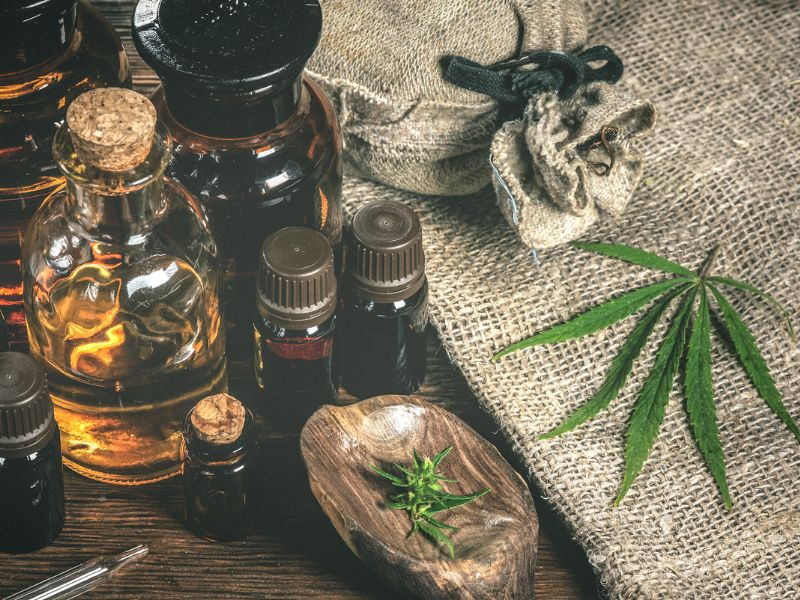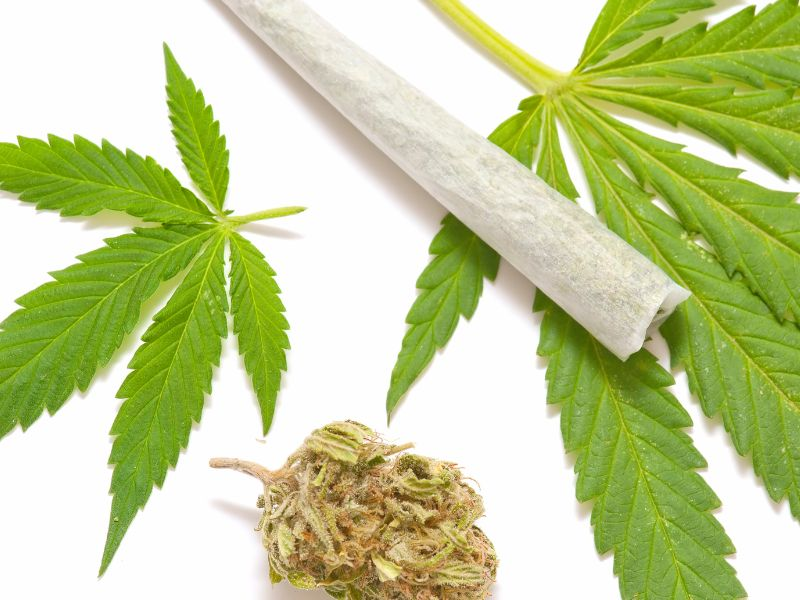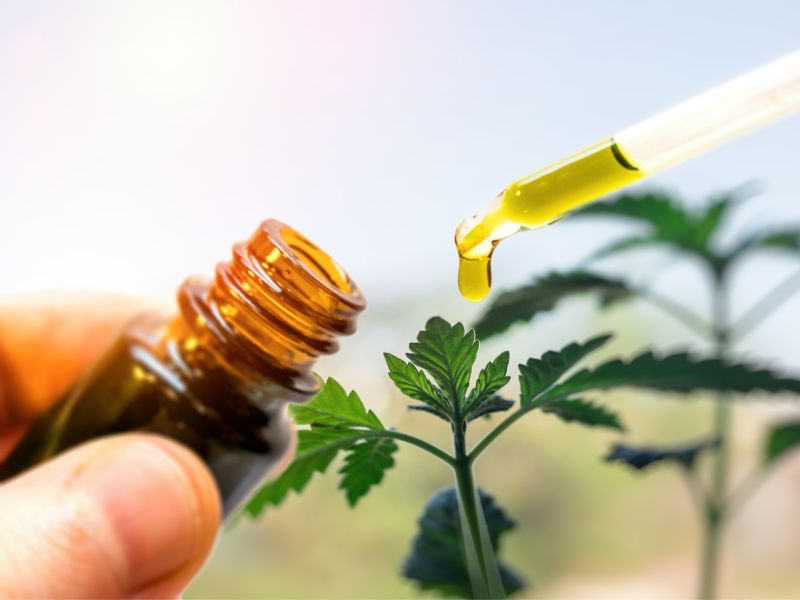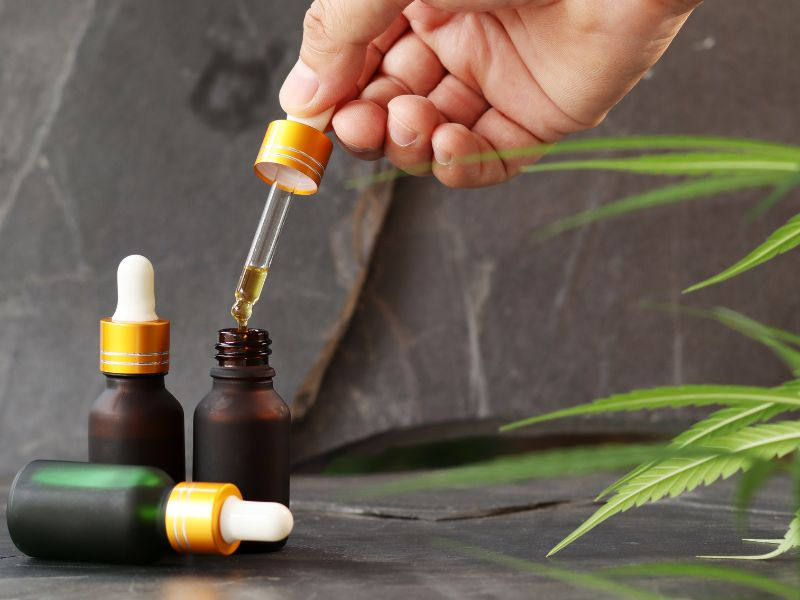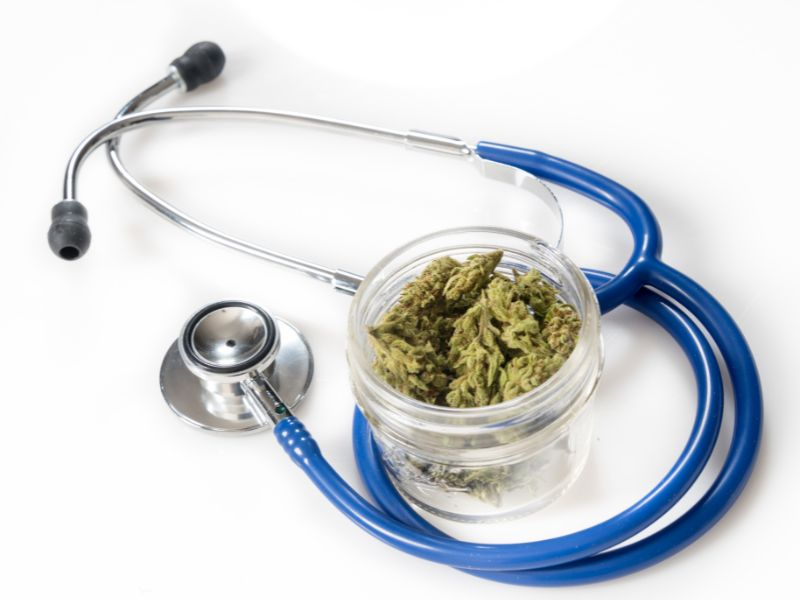What is THC-P?
THC-P, also known as Δ8-Tetrahydrocannabiphorol or Delta-8-THC-P, is a new cannabinoid that has recently gained attention due to its potential therapeutic benefits and effects. As a cannabinoid, THC-P interacts with the endocannabinoid system (ECS) in the body, which plays a crucial role in regulating various physiological processes such as mood, pain sensation, appetite, and immune function. THC-P is typically found in very low concentrations in the Cannabis plant; on average, THC-P is present in cannabis plants at levels of less than 0.1%, which is significantly lower than the more well-known cannabinoid THC, which can be found in cannabis plants at concentrations of around 30%.
How does THC-P work?
THC-P (tetrahydrocannabiphorol), a newly discovered compound found in cannabis, interacts with the endocannabinoid system in a manner similar to THC, but with a significantly higher affinity to bind with cannabinoid receptors. Recent research has shown that THC-P has a binding affinity to CB1 receptors up to 33 times greater than traditional THC, suggesting that THC-P may be potentially up to 33 times more potent than THC.
Upon ingestion or inhalation, THC-P enters the bloodstream and crosses the blood-brain barrier, allowing it to interact with CB1 receptors in the brain and central nervous system.
When THC-P binds to CB1 receptors, it triggers a cascade of biochemical events that can modulate the release of neurotransmitters, such as dopamine, glutamate, and GABA, leading to various physiological effects. The cannabinoid’s ability to increase binding affinity of THC-P to CB1 receptors compared to THC may explain its potential for increased potency.
It’s important to note that THC-P is a relatively newly discovered compound, and research on its effects and safety is still ongoing.
What Does THC-P Do? THC-P Uses and Benefits
The benefits and therapeutic effects of THC-P are still being studied, and research is ongoing. However, some potential benefits of THC-P may include:
Increased Potency
THC-P is believed to be significantly more potent than delta-9-tetrahydrocannabinol (THC), which is the most well-known cannabinoid found in cannabis. It has been reported to be up to 30 times more potent than THC, which means that smaller doses may be needed to achieve the desired effects.
Pain Relief
Like other cannabinoids, THC-P may have analgesic properties and could potentially be used for pain relief. It may interact with the endocannabinoid system to modulate pain signaling pathways, which could make it useful for managing various types of pain, including chronic pain.
Neuroprotective Effects
Some research suggests that THC-P may have neuroprotective properties, meaning it could help protect nerve cells from damage or degeneration. This could have potential implications for conditions such as neurodegenerative diseases, including Alzheimer’s disease and Parkinson’s disease, although more research is needed.
Appetite Stimulation
THC-P, like THC, is known to increase appetite, which could be beneficial for individuals who have a reduced appetite due to medical conditions or treatments such as chemotherapy.
Mood Enhancement
THC-P may have mood-enhancing effects, as it is believed to interact with endocannabinoid receptors in the brain that are involved in regulating mood and emotions. It could potentially be used for managing symptoms of mood disorders such as depression and anxiety, although further research is needed.
It’s important to note that THC-P is a synthetic cannabinoid, and its effects and safety profile may not be fully understood. As with any substance, it should be used with caution and under the guidance of a qualified healthcare professional. It is also subject to legal regulations in many jurisdictions, and its use may be restricted or prohibited in some areas. It’s always recommended to consult with a healthcare provider and follow local laws and regulations before using THC-P or any other cannabinoid for medicinal or recreational purposes.
Does THC-P get you high? What are the effects of THC-P?
THC-P effects may vary among individuals and can be influenced by various factors, including dosage, tolerance, and individual physiology.
Since THC-P is believed to interact with the same cannabinoid receptors in the human body as THC, it may produce similar effects to THC, which is the main psychoactive compound found in cannabis. These effects may include:
- Euphoria: THC-P may induce feelings of euphoria or a “high,” which can result in altered mood and a sense of well-being.
- Relaxation: THC-P may have calming and relaxing effects, which can lead to a sense of relaxation and reduced stress or anxiety.
- Changes in perception: Like THC, THC-P may alter perception, including changes in sensory perception, time perception, and alterations in auditory and visual perception.
- Increased appetite: THC-P may stimulate appetite, also known as the “munchies,” which can result in increased hunger or food cravings.
- Impaired coordination and cognition: THC-P, like THC, may impair coordination, concentration, and cognitive function, leading to decreased motor skills, impaired judgment, and memory impairment.
It is important to note that the effects of THC-P can vary widely among individuals and may not be the same for everyone. The potency of THC-P is believed to be higher than THC, which means that lower doses of THC-P may produce stronger effects compared to THC. Additionally, the safety profile of THC-P is not yet fully understood, and the use of THC-P, like other cannabis products, should be approached with caution, under the guidance of a qualified healthcare professional, if deemed appropriate, and in compliance with local laws and regulations.
What Makes THC-P Unique from Other Cannabinoids
THC-P is a cannabinoid that is chemically distinct from other cannabinoids found in the cannabis plant, including delta-9-tetrahydrocannabinol (THC) and cannabidiol (CBD). Here are some key characteristics that make THC-P unique:
Potency
THC-P is believed to be more potent than THC, the primary psychoactive compound found in cannabis. Studies suggest that THC-P may bind more strongly to cannabinoid receptors in the body, potentially leading to more potent effects at lower doses compared to THC. However, research on THC-P is still limited, and its exact potency and effects are not fully understood.
Interactions with Cannabinoid Receptors
THC-P has a unique chemical structure that distinguishes it from other cannabinoids. It has a longer side chain compared to THC, which may affect its interactions with cannabinoid receptors in the body and potentially lead to different effects.
Limited Research
THC-P is a relatively new and lesser-known cannabinoid, and there is limited research available on its properties, effects, and safety profile. Most of the information on THC-P is based on preclinical studies and anecdotal reports, and more research is needed to fully understand its unique characteristics and effects.
Legal Status
THC-P may have a different legal status compared to naturally occurring cannabinoids like THC and CBD. The legal status of THC-P may vary depending on the jurisdiction, and it is important to check local laws and regulations before using or possessing THC-P.
It is worth noting that while THC-P may have unique properties and effects, the potential risks and benefits associated with its use are not yet fully understood, and it should be used with caution, under the guidance of a qualified healthcare professional if deemed appropriate, and in compliance with local laws and regulations.
Potential Negative Side Effects of THC-P
As a relatively new and lesser-known cannabinoid, the potential side effects of THC-P are not yet fully understood, as research on this compound is limited. However, based on what is currently known about cannabinoids in general, including THC (delta-9-tetrahydrocannabinol), which is the primary psychoactive compound found in cannabis, there are some potential side effects that may be associated with THC-P use. These may include:
Psychoactive Effects
THC-P is believed to interact with cannabinoid receptors in the body, which may result in psychoactive effects, including changes in mood, perception, and cognition. These effects may include feeling “high,” altered perception of time, changes in sensory perception, impaired judgment, and memory impairment.
Respiratory Effects
If THC-P is consumed by smoking or vaping, it may have similar respiratory effects as smoking or vaping other substances, such as potential lung irritation, coughing, or respiratory discomfort.
Cardiovascular Effects
THC-P may have cardiovascular effects, including increased heart rate and changes in blood pressure. This may be of concern for individuals with pre-existing cardiovascular conditions.
Psychological Effects
THC-P may potentially have psychological effects, including changes in mood, anxiety, paranoia, and other mental health-related effects. The impact of THC-P on mental health may vary among individuals and may be influenced by factors such as dosage, frequency of use, and individual vulnerability.
Motor Impairment
THC-P, similar to THC, may impair coordination, concentration, and motor skills, which may affect activities such as driving or operating heavy machinery.
Other potential side effects of THC-P may include dry mouth, red eyes, dizziness, and gastrointestinal discomfort, although the exact profile of side effects associated with THC-P is not yet well-established.
It is important to note that the safety profile of THC-P is not yet fully understood, and the potential risks and benefits associated with its use are not well-established. THC-P should be used with caution, under the guidance of a qualified healthcare professional if deemed appropriate, and in compliance with local laws and regulations.
THC-P Products
Here are some types of THC-P products that you might find on the market:
- THC-P oil or tinctures: THC-P can be formulated into oil-based products, such as oral tinctures or sublingual oils, which can be ingested orally for potential therapeutic or recreational use. These types of products are commonly used in conjunction with other cannabinoids like THC and CBD for various purposes.
- THC-P vape cartridges: THC-P can be formulated into vape cartridges or vape pens for inhalation, allowing for fast-acting effects. However, it is important to note that vaping in general may carry potential risks to lung health and should be approached with caution.
- THC-P edibles: THC-P can be incorporated into edible products, such as gummies, chocolates, or baked goods, for oral consumption. Edibles are a popular form of cannabis consumption, as they offer a discreet and convenient way to consume cannabinoids.
- Topical THC-P products: THC-P can be used in topical products, such as creams, lotions, or salves, for potential localized effects. Topical cannabinoids are commonly used for their potential anti-inflammatory and pain-relieving properties.
- THC-P capsules or pills: THC-P can also be formulated into capsules or pills, allowing for controlled dosing and convenient oral administration.
Is THC-P Legal?
The legality of hemp derived cannabinoids, like hemp derived THC-P varies by jurisdiction and can be complex, as it is subject to different laws and regulations in different countries, states, and localities. Products containing hemp derived cannabinoids, like hemp derived THC-P, are generally considered federally legal. Here are some general points regarding the legality of hemp derived THC-P:
In the United States, the legality of CBD derived products are governed by federal and state laws. Under federal law, CBD products derived from hemp, which contains no more than 0.3% THC (the psychoactive compound found in cannabis), are legal under the 2018 Farm Bill. However, CBD products derived from marijuana, which contains more than 0.3% THC, are classified as a Schedule I controlled substance and is illegal at the federal level, although some states have legalized marijuana for medical or recreational use, allowing for CBD derived from marijuana to be legal under state law.
Is THC-P Safe?
As a relatively new and lesser-known cannabinoid, THC-P (tetrahydrocannabiphorol) has limited research on its safety, and its long-term effects and safety profile are not fully understood. Some potential concerns with THC- P use may include:
- Unknown long-term effects: Due to the limited research on THC-P, its potential long-term effects on human health are not fully understood, and there may be risks associated with its use that are not yet known.
- Psychoactive effects: THC-P is reported to be highly potent and may have intense effects on the psyche. This may result in unexpected and potentially uncomfortable or adverse reactions, especially in individuals who are sensitive to THC or have a low tolerance for psychoactive substances.
- Adverse effects: Like other cannabinoids, THC-P may have potential adverse effects, such as changes in heart rate, blood pressure, and mental state. The specific adverse effects of THC-P may be different from those of other cannabinoids due to its unique properties.
- Legality and quality control: The legality and quality of THC-P products may vary, as synthetic cannabinoids are subject to regulation, and there may be concerns about product purity, potency, and consistency.
It’s important to note that the safety of THC-P or any other cannabinoid product may depend on various factors, including the individual’s age, health status, and underlying medical conditions, as well as the dosage, mode of administration, and potential interactions with other medications or substances.
Will THC-P show up in a drug test?
In general, most CBD (cannabidiol) products that are derived from hemp and contain only trace amounts of THC (tetrahydrocannabinol) at or below the legal limit of 0.3% are unlikely to cause a positive result on a standard drug screen for THC, but it is still possible. It’s important to note that there are several factors that can affect the likelihood of CBD products showing up on a drug test, including the sensitivity of the test, the dosage and frequency of CBD product use, individual metabolism, and the quality and composition of the CBD product.
Here are some key points to consider regarding CBD and drug testing:
- THC content: CBD products derived from hemp that contain only trace amounts of THC at or below the legal limit of 0.3% are unlikely to cause a positive result on a standard drug screen for THC. However, some CBD products, particularly those derived from marijuana or with higher THC content, may contain enough THC to potentially trigger a positive result on a drug test.
- Test sensitivity: The sensitivity of drug tests can vary, with some tests being more sensitive than others. Some drug tests may have a lower threshold for THC detection, and even trace amounts of THC in CBD products may result in a positive test result.
- Product quality and composition: The quality and composition of CBD products can vary, and some products may be labeled inaccurately or may contain contaminants, including THC. It’s important to choose reputable CBD products from reliable sources that undergo third-party testing for quality and purity to minimize the risk of THC contamination.
- Individual metabolism: Metabolism rates can vary from person to person, and THC or its metabolites can remain in the body for varying periods of time. Factors such as body weight, hydration levels, and overall health can affect how quickly THC is metabolized and eliminated from the body, which may impact the detection window in drug tests.
- Risk of cross-contamination: In some cases, there may be a risk of cross-contamination during CBD product manufacturing, packaging, or handling, which could potentially result in trace amounts of THC being present in CBD products that are labeled as THC-free.
It’s important to be aware of the potential risks of CBD products showing up on a drug test, especially if you are in a situation where drug testing is a concern, such as in the workplace or for legal or professional reasons. If you are subject to drug testing and have concerns about CBD product use, it’s recommended to consult with your employer, healthcare provider, or a legal professional for personalized advice.
THC-O vs THC-P
THC-O (tetrahydrocannabinol-o-acetate) and THC-P (tetrahydrocannabiphorol) are both newer cannabinoids that have gained attention for their potential potency and unique effects. However, there are some differences between THC-O and THC-P:
- Chemical structure: THC-O (tetrahydrocannabinol-o-acetate) is a semi-synthetic cannabinoid that is not produced by cannabis plants. It is considered a pro-drug, meaning its effects are not felt until it is metabolized by the body, while THC-P is already active before it enters the body. Additionally, THC-O is a semi-synthetic cannabinoid, meaning it is synthesized from natural cannabinoids, while THC-P is a naturally occurring cannabinoid.
- Potency: THC-P is reported to be significantly more potent than THC-O (tetrahydrocannabinol-o-acetate). THC-P’s potency is estimated to be around 200% higher than that of THC-O. In comparison, THC-O is claimed to be about three times stronger than THC, so the potential effects of THC-P on one’s high can be imagined to be even more potent.
- Effects: THC-O and THC-P are both reported to have potent psychoactive effects, similar to delta-9-THC, but with some differences. Users have reported intense and long-lasting effects with both THC-O and THC-P, including altered perception, relaxation, and potential sedation. However, due to their higher potency, the effects of THC-O and THC-P may be more pronounced and potentially overwhelming compared to delta-9-THC.
- Legality: The legality of THC-O and THC-P may vary depending on local laws and regulations. It’s important to check the local laws and regulations in your area before using THC-O, THC-P, or any other cannabinoid product.
It’s worth noting that due to the limited research and knowledge about THC-O and THC-P, there may be risks associated with their use, and caution is advised. If you are considering using THC-O, THC-P, or any other cannabinoid product, it’s recommended to consult with a qualified healthcare professional for personalized advice and to ensure that you are aware of the potential risks and benefits associated with their use.
Should I Try THC-P?
When considering trying products containing THC-P, it is ultimately up to you to make a decision. However, we strongly advise obtaining such products from reputable vendors who provide third-party testing and certificates of analysis to ensure quality and safety. Always prioritize your health and safety, and consult with a qualified healthcare professional before trying any new cannabis products, especially if you have pre-existing medical conditions or concerns.
